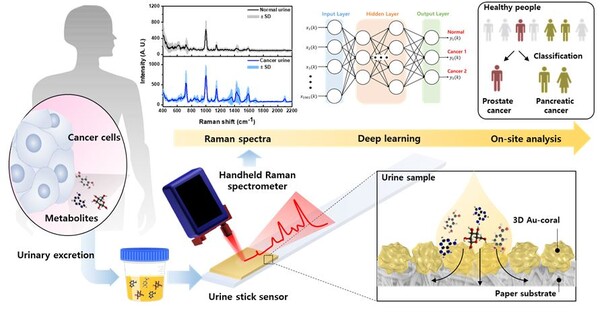The Korea Institute of Materials Science (KIMS) said it has developed a strip-type urine sensor that can amplify metabolite light signals in urine and detect prostate and pancreatic cancer.

The technology was developed by Professors Jung Ho-sang at KIMS, Roh Jun-suk at Pohang University of Science and Technology, and Choi Sam-jin at Kyung Hee University College of Medicine.
The research team paid attention to the difference in metabolomic components in the urine of cancer patients and non-patients.
According to the team, when cancer cells in the body proliferate, they secrete metabolites that are different from those of non-patients into urine due to abnormal metabolism.
However, using them in the medical field was not easy because the test required expensive and large equipment to distinguish them.
To resolve this issue, the research team developed a label-free surface-enhanced Raman scattering sensor based on a three-dimensional plasmonic coral nanoarchitecture (3D-PCN), which has strong electromagnetic field enhancement through multiple hot spots, to amplify the optical signal of metabolites in urine by more than 1 billion times on porous paper.
The research team applied an AI-based analysis method to the spectral signal emitted by light irradiation on a volume of urine, and as a result, they could distinguish up to 99 percent of non-cancer patients from prostate and pancreatic cancer patients.
The research team seeks to patent this technology in Korea and the U.S., conducting research to increase the types of cancer that can be diagnosed through this test method.
“The technology can be used for a new cancer diagnosis method, rapid on-site cancer patient screening, and recurrence monitoring after cancer patient treatment,” Professor Jung said. “Also, since the production price of the strip type sensor is less than 100 won ($0.08) per unit, it is expected that it can be used for mass inspection.”
The study result was published in the latest issue of Biosensors and Bioelectronics.

